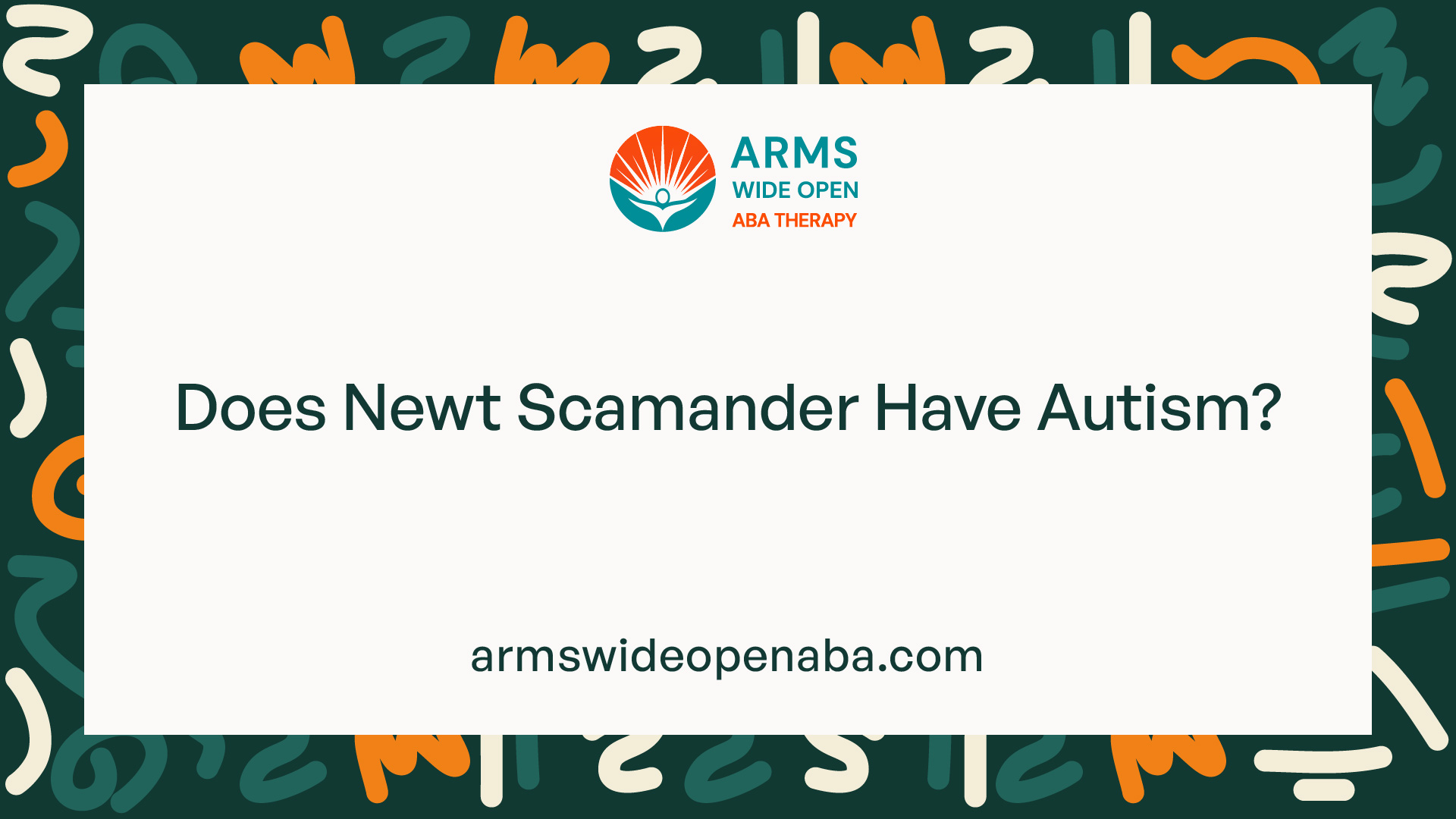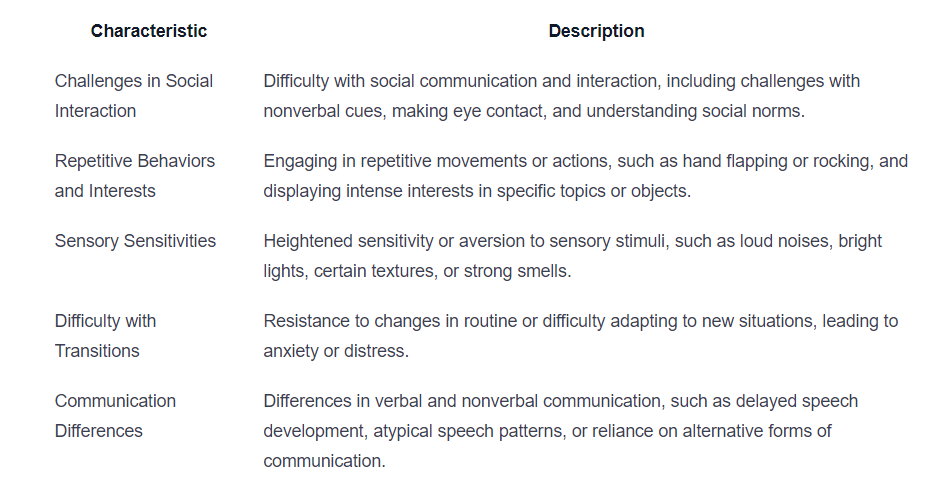Does Newt Scamander Have Autism?
Unmasking Newt Scamander: Discovering the truth about the autism theory. Explore the complexity of his behavior and diverse representation.

When it comes to beloved fictional characters, Newt Scamander from J.K. Rowling's "Fantastic Beasts" series has captured the hearts of many fans. Over the years, a theory has emerged suggesting that Newt may be portrayed as a character on the autism spectrum. In this article, we will explore the fascination with Newt Scamander and delve into the autism theory surrounding his character.

The Fascination with Newt Scamander
Newt Scamander, portrayed by actor Eddie Redmayne, is a renowned magizoologist and the protagonist of the "Fantastic Beasts" series. His unique personality, quirks, and deep connection with magical creatures have made him a fan favorite. Many viewers have been captivated by Newt's unconventional behavior, leading to speculation about his character traits, including the possibility of him being autistic.
Exploring the Autism Theory
Autism is a neurodevelopmental condition that affects individuals in various ways. As fans analyzed Newt's behavior, they noticed certain characteristics that aligned with commonly observed traits in individuals on the autism spectrum. This sparked a discussion about whether J.K. Rowling intentionally portrayed Newt as an autistic character.
In the following sections, we will delve deeper into the understanding of autism, analyze Newt Scamander's behavior through the lens of autism, and explore alternative interpretations. It is important to approach this topic with respect and recognize the potential impact of diverse representation in media. Let us explore the fascination with Newt Scamander and examine the autism theory surrounding his character.
Understanding Autism
To better comprehend the autism theory surrounding Newt Scamander, it is important to have a clear understanding of autism itself. This section will provide an overview of what autism is and highlight some common characteristics associated with it.
What is Autism?
Autism, also known as Autism Spectrum Disorder (ASD), is a neurodevelopmental disorder that affects communication, social interaction, and behavior. It is characterized by a range of challenges and strengths, leading to a unique profile for each individual on the autism spectrum.
Autism is considered a spectrum disorder because it encompasses a wide range of abilities and characteristics. Some individuals with autism may require significant support in their daily lives, while others function independently with minimal assistance. It is crucial to recognize that autism is not a disease or something that needs to be cured, but rather a different way of experiencing the world.
Common Characteristics of Autism
While autism manifests differently in each individual, there are several common characteristics that are often associated with the condition. These include:

It is important to note that not all individuals with autism will exhibit every characteristic listed above, and the degree to which these characteristics are present can vary greatly among individuals. Autism is a complex and diverse condition, and each person's experience is unique.
Understanding the core features of autism can help provide context when examining the behavior of fictional characters like Newt Scamander. However, it is essential to remember that autism is a real-world condition, and any analysis of a character's behavior should be done with sensitivity and respect for the diversity within the autism community.
Analyzing Newt Scamander's Behavior
To further explore the autism theory surrounding Newt Scamander, it is important to analyze his behavior and characteristics. By examining aspects such as social communication and interaction, sensory sensitivities, repetitive behaviors, and special interests, we can gain a deeper understanding of his portrayal.
Social Communication and Interaction
Newt Scamander's social communication and interaction style exhibit some characteristics that align with autism. He often struggles with maintaining eye contact, which is a common trait among individuals on the autism spectrum. Additionally, his social interactions can be awkward and he may have difficulty understanding social cues or norms.

Sensory Sensitivities and Repetitive Behaviors
Another aspect to consider is Newt's sensory sensitivities and repetitive behaviors. People with autism often experience heightened sensory sensitivities, which can lead to discomfort or distress in certain environments. Newt demonstrates sensitivity to loud noises and crowded spaces, indicating a potential sensory sensitivity.
Furthermore, Newt's repetitive behaviors, such as his meticulous organization of magical creatures and adherence to specific routines, suggest a preference for predictability and order. These repetitive behaviors are commonly observed in individuals with autism.

Special Interests and Routines
Newt Scamander's deep fascination and encyclopedic knowledge of magical creatures can be seen as a special interest, a characteristic often associated with autism. Individuals on the autism spectrum may develop intense interests in specific subjects and acquire extensive knowledge about them. Newt's dedication to studying and documenting magical creatures aligns with this characteristic.
Moreover, Newt's strict adherence to routines, as seen in his meticulous care for his creatures, suggests a need for predictability and structure. Routine-oriented behavior is often observed in individuals with autism as it provides a sense of security and stability.

By examining these aspects of Newt Scamander's behavior, we can see that some of his characteristics align with those commonly associated with autism. However, it is important to consider alternative interpretations and the complexity of character traits before making definitive conclusions about his representation.
Debunking the Autism Theory
While the autism theory surrounding Newt Scamander has gained traction among fans, it's important to consider alternative interpretations of his behavior and acknowledge the complexity of character traits.
Alternative Interpretations of Newt's Behavior
Newt Scamander's unique personality and behaviors have been subject to various interpretations. While some fans argue that his characteristics align with those commonly associated with autism, others offer alternative explanations for his behavior. It's crucial to remember that fictional characters can possess a range of traits that may not necessarily align with a specific diagnosis.
Newt's quirks and idiosyncrasies could be attributed to his deep connection with magical creatures and his unconventional career as a magizoologist. His introverted nature, for example, may stem from his preference for the company of animals rather than humans. Additionally, his focus and dedication to his work might be seen as a reflection of his passion and commitment to preserving and protecting magical creatures.
The Complexity of Character Traits
Character traits in literature, including those exhibited by Newt Scamander, are often multifaceted and can be interpreted in various ways. While some behaviors might appear similar to those associated with autism, it is essential to recognize that individuals, both real and fictional, can exhibit a wide range of traits that do not necessarily fit into a single diagnostic category.
Newt Scamander's character showcases a rich tapestry of personality traits that go beyond any single label or diagnosis. Viewing his behaviors through a singular lens limits the depth and complexity of his character. Instead, appreciating the intricacies and nuances of Newt's personality allows for a more comprehensive understanding of his role within the Wizarding World.
By acknowledging alternative interpretations and the complex nature of character traits, we can appreciate Newt Scamander as a multidimensional character, rather than confining him to a singular diagnosis. It is important to remember that representation in literature should be diverse and inclusive, offering a wide range of characters with various traits and backgrounds.
Appreciating Diverse Representation
In recent years, there has been a growing emphasis on diverse representation in media and entertainment. This includes a focus on portraying characters with different backgrounds, identities, and abilities. The representation of autism in popular culture, such as in the case of Newt Scamander from the "Fantastic Beasts" series, has sparked discussions and debates. Let's explore the positive impact of autism representation and the importance of authentic portrayals.
Positive Impact of Autism Representation
The inclusion of characters with autism in mainstream media has had a profound impact on raising awareness and understanding of autism spectrum disorder (ASD). It provides an opportunity for individuals on the spectrum and their families to see themselves reflected in fictional characters, fostering a sense of belonging and acceptance.
By showcasing characters like Newt Scamander, who may exhibit certain characteristics associated with autism, media representations can challenge stereotypes and promote a more accurate understanding of autism. This can lead to increased empathy and compassion among viewers, as well as a broader acceptance of neurodiversity.
Autism representation in popular culture also has the potential to educate and inform the general public about the diverse experiences of individuals with autism. It can encourage dialogue and spark conversations about autism, helping to break down barriers and reduce stigma.
Importance of Authentic Portrayals
While the representation of autism in media is a step forward, it is crucial that portrayals are authentic and respectful. It is important to remember that autism is a spectrum, and individuals with autism have unique experiences and strengths. Therefore, it is essential to avoid generalizations and stereotypes when depicting autistic characters.
Authentic portrayals require extensive research and consultation with individuals on the autism spectrum, as well as professionals in the field. This ensures that the portrayal accurately reflects the experiences and challenges faced by individuals with autism. It also helps to avoid perpetuating harmful misconceptions or misrepresentations.
By prioritizing authenticity, media creators can provide a more nuanced and realistic depiction of autism. This not only benefits individuals on the autism spectrum but also contributes to a more inclusive and diverse media landscape overall.
In conclusion, the positive impact of autism representation in popular culture cannot be understated. It helps to foster understanding, acceptance, and empathy toward individuals with autism. However, it is crucial that these representations are authentic and respectful, avoiding stereotypes and promoting an accurate understanding of autism. By appreciating diverse representation and striving for authenticity, we can create a more inclusive and empathetic society for all.
Analyzing Newt Scamander's Behavior
When examining the character of Newt Scamander and considering the autism theory, it is important to analyze his behavior in relation to common characteristics of autism.
Social Communication and Interaction
One aspect of autism is challenges in social communication and interaction. Individuals with autism may struggle with nonverbal cues, maintaining eye contact, and understanding social norms. When observing Newt Scamander, it is evident that he exhibits some social quirks and struggles with traditional social interactions. However, it is essential to note that these behaviors alone do not confirm an autism diagnosis. Other factors and interpretations should also be considered.
Sensory Sensitivities and Repetitive Behaviors
Individuals on the autism spectrum often experience sensory sensitivities and engage in repetitive behaviors. Newt Scamander demonstrates sensory sensitivities throughout the "Fantastic Beasts" series, particularly when it comes to his interactions with creatures and his focus on observing and studying them. While these sensitivities and focused interests are consistent with some autistic traits, they should not be solely attributed to autism.
Special Interests and Routines
Another characteristic often associated with autism is the presence of special interests and adherence to routines. Newt Scamander's deep passion for magical creatures and his commitment to their well-being align with this characteristic. His meticulous approach to maintaining routines, such as feeding and caring for the creatures, also suggests a preference for structure and predictability. However, it is important to recognize that many individuals without autism also have special interests and routines.
While Newt Scamander's behavior exhibits some similarities to characteristics commonly associated with autism, it is crucial to approach the autism theory with caution. A character's personality and behaviors can be multifaceted and influenced by various factors. Alternative interpretations of Newt's behavior should be explored, considering the complexity of character traits and the intentions of the creators behind the portrayal.
Understanding and appreciating diverse representation in media is vital. Positive and authentic portrayals of autism can help foster understanding and acceptance. It is important to celebrate the representation of autistic characters while also acknowledging the complexities of their traits and the need for accurate and respectful portrayals in storytelling.
Sources
https://www.goldstarrehab.com/parent-resources/newt-scamander-autism
https://www.apexaba.com/blog/does-newt-scamander-have-autism
https://www.abtaba.com/blog/newt-scamander-autism
Similar articles
We’re here to help you

Our team is here to assist you in this process. Contact us for any assistance.
it’s easy to apply
We Accept Most Insurances
Our in-network insurance partnerships make ABA therapy more accessible to families throughout our service areas.







Our Insurance Process
We'll request your insurance details to help us verify your plan's coverage for ABA therapy. Once we've received this information, we'll walk you through your benefits, including copayments, deductibles and out-of-pocket maximums, so you know what to expect in advance.
Our team will then handle the preauthorization and all the necessary paperwork.
.svg)





















.jpeg)


































.jpeg)




.jpeg)







.jpeg)











.jpeg)
















